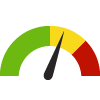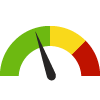Indicator Gauge Icon Legend
Legend Colors
Red is bad, green is good, blue is not statistically different/neutral.
Compared to Distribution
 the value is in the best half of communities.
the value is in the best half of communities.
 the value is in the 2nd worst quarter of communities.
the value is in the 2nd worst quarter of communities.
 the value is in the worst quarter of communities.
the value is in the worst quarter of communities.
Compared to Target
 meets target;
meets target;  does not meet target.
does not meet target.
Compared to a Single Value
 lower than the comparison value;
lower than the comparison value;
 higher than the comparison value;
higher than the comparison value;
 not statistically different from comparison value.
not statistically different from comparison value.
Trend

 non-significant change over time;
non-significant change over time; 
 significant change over time;
significant change over time;  no change over time.
no change over time.
Compared to Prior Value
 higher than the previous measurement period;
higher than the previous measurement period;
 lower than the previous measurement period;
lower than the previous measurement period;
 no statistically different change from previous measurement period.
no statistically different change from previous measurement period.
 Significantly better than the overall value
Significantly better than the overall value
 Significantly worse than the overall value
Significantly worse than the overall value
 No significant difference with the overall value
No significant difference with the overall value
 No data on significance available
No data on significance available
Lung and Bronchus Cancer Incidence Rate
This indicator is archived and is no longer being updated. Click to learn more
Why is this important?
County: Sussex
Measurement period: 2017-2021
Maintained by: Conduent Healthy Communities Institute
Last update: November 2024
Graph Selections
| County | Source | Measurement Period | Cases per 100,000 population | |
|---|---|---|---|---|
Data Source
- National Cancer Institute
Maintained By: Conduent Healthy Communities Institute (Methodology)
Filed under: Health / Cancer, Health / Respiratory Diseases, Health / Tobacco Use, Health Outcomes



